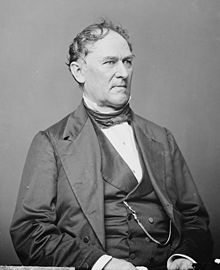 |
| Senator O. H. Browning |
WAR DEPARTMENT,
Washington, December 4, 1862
Major-General ROSECRANS, Nashville, Tenn.:
The President is very impatient at your long stay in Nashville. The favorable season for your campaign will soon be over. You give Bragg time to supply himself by plundering the very country your army should have occupied. From all information received here, it is believed that he is carrying large quantities of stores into Alabama, and preparing to fall back partly on Chattanooga and partly on Columbus, Miss. Twice have I been asked to designate some one else to command your army. If you remain one more week at Nashville, I cannot prevent your removal. As I wrote you when you took the command, the Government demands action, and if you cannot respond to that demand some one else will be tried.
H. W. HALLECK,.
General-in-Chief.
NASHVILLE, TENN.
December 4, 1862-10.45 p.m.
Major-General H. W. HALLECK,
General-in-Chief:
Your dispatch received. I reply in few but earnest words. I have lost no time. Everything I have done was necessary, absolutely so; and has been done as rapidly as possible. Any attempt to advance sooner would have increased our difficulty both in front and rear. In front, because of greater obstacles, enemies in great force, and fighting with better chances of escaping pursuit, if overthrown in battle. In rear, because of insufficiency and uncertainty of supplies, both of subsistence and ammunition and no security of any kind to fall back upon in case of disaster. We should most probably have had a flying enemy to pursue, with a command daily frittered away by the large detachments required to guard forage and provision trains, and after all have been obliqued to halt somewhere, to await the indispensable supplies, for which we have been waiting. Many of our soldiers are to this day barefoot, without blankets, without tents, without good arms, and cavalry without horses. Our true objective now is the enemy's force, for if they come near we save wear, tear, risk, and strength; subject them to what we escape, and gain all the chances to be expected from a rise in the river. If the Government which ordered me here confides in my judgment, it may rely on my continuing to do what I have been trying to---that is, my whole duty. If my superiors have lost confidence in me, they had better at once put some one in my place and let the future test the propriety of the change. I have but one word to add, which is, that I needed no other stimulus to make me do my duty than the knowledge of what it is. To threats of removal or the like I must be permitted to say that I am insensible.
W. S. ROSECRANS,
Major-General
Official Records, Series I., Vol. 20, Part 2, Page 116.
Rosecrans was given Buell's command because the administration thought he was too slow. Now, barely into his new command Rosecran's is being threatened. General Stone was under arrest, Porter was to face a court martial, McDowell requested an inquiry into his conduct, McClellan was in New Jersey awaiting orders which were not coming, Banks was told to depart for New Orleans before Congress could reconvene and send him elsewhere, and Rosecrans was under threat. Lincoln's administration had very little understanding of logistics and the President was bullied by radical Republicans. If you go to any point at which a command change is made, the President will have met with a Republican congressman immediately prior to the change. In this case, Lincoln had just gotten through meeting with Senator O. H. Browning of Illinois to discuss military affairs.
No comments:
Post a Comment